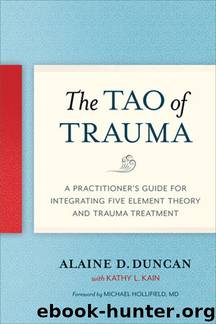The Tao of Trauma: A Practitioner's Guide for Integrating Five Element Theory and Trauma Treatment by Alaine D. Duncan & Kathy L. Kain

Author:Alaine D. Duncan & Kathy L. Kain
Language: eng
Format: epub
ISBN: 9781623172237
Publisher: North Atlantic Books
Published: 2018-11-17T16:00:00+00:00
Common Symptoms for the Water Type: The Kidneys and Bladder
The massive qi harnessed by the Kidneys in the presence of life threat, and the breadth of its influence, give rise to diverse symptoms, as well as many avenues for restoring its regulation. The Kidney’s critical role as the signaling center for life threat makes it an important organ to work with in virtually all survivor types. AAM speaks to the significant and complex role of the Kidneys in our overall health and vitality by recognizing it as the root of all yin and all yang. The Kidneys are understood to be the origin and foundation for both the yin and the yang of all other body organs. Their yin aspect is responsible for birth, growth, and reproduction, while their yang aspect is the source of energy for all physiological processes.3
Because of its crucial and powerful role in our physiology, the impact of chronic, unremitting fear on the Kidneys is profound. Such fear creates chronic stress chemistry, which wreaks havoc on the physical body and profoundly impacts our mind and emotions.4 This constant signaling of danger can become consuming. Water survivor types may appear to be over- or under-adrenalized—either unable to sit still or, conversely, unable to initiate movement.
There is an intimate relationship between the Kidneys and the Heart in AAM trauma physiology. Those whose self-protective response was thwarted in the signal threat phase have difficulty discerning both safety and danger, because the signaling center in the Kidneys sends the wrong messages to the Heart. The Kidneys may signal danger when there is none or may fail to signal danger when life threat is imminent. This intimate role between the Kidneys and the Heart can give rise to cardiac symptoms that are actually rooted in our Kidneys. Blood pressure and the strength of our heart’s contractions are particularly impacted by kidney function.
For Water types, fear can dominate interpersonal relationships. We may have too much fear—we don’t connect with or trust anyone. Alternatively, we don’t use our fear effectively and are frequently hurt when we place ourselves in risky situations with untrustworthy people.
When stuck in this phase of the trauma cycle, the body makes use of cortisol and adrenalin in distorted ways, impacting the messaging of our endocrine system and, by extension, virtually every body function. When functioning well, these stress hormones rise to help us meet a challenge and then return to equilibrium when we know we are safe. In trauma survivors, the message “it’s over” that is signaled by a reduction in cortisol levels is disturbed—and so the stress response doesn’t return to its baseline.5
Our jing, or our core vitality—which is stored in our Kidneys—is particularly vulnerable to traumatic stress. It can be prematurely depleted by too much exercise or hard work, too many births for women, or exposure to repeated and overwhelming fear. Traumatic stress can consume our jing, which is why we look for early signs of aging in this survivor type—weak bones or teeth, loss of hearing, or early greying of hair are signs of its depletion.
Download
This site does not store any files on its server. We only index and link to content provided by other sites. Please contact the content providers to delete copyright contents if any and email us, we'll remove relevant links or contents immediately.
| Acupuncture & Acupressure | Aromatherapy |
| Ayurveda | Chelation |
| Chinese Medicine | Energy Healing |
| Healing | Herbal Remedies |
| Holistic | Homeopathy |
| Hypnotherapy | Massage |
| Meditation | Naturopathy |
| Reference |
Inner Engineering: A Yogi's Guide to Joy by Sadhguru(5946)
The Power of Now: A Guide to Spiritual Enlightenment by Eckhart Tolle(4806)
Fear by Osho(4120)
The Art of Happiness by The Dalai Lama(3420)
The Ultimate Bodybuilding Cookbook by Kendall Lou Schmidt(3361)
Yoga Therapy by Mark Stephens(3250)
Ikigai by Héctor García & Francesc Miralles(3215)
The Little Book of Hygge by Meik Wiking(3110)
Why Buddhism is True by Robert Wright(2863)
The Healing Self by Deepak Chopra(2827)
Being Aware of Being Aware by Rupert Spira(2733)
Shift into Freedom by Loch Kelly(2714)
Wild Words from Wild Women by Stephens Autumn(2619)
Work Clean by Dan Charnas(2583)
Happiness by Matthieu Ricard(2551)
The Hatha Yoga Pradipika (Translated) by Svatmarama(2534)
Yoga Body & Mind Handbook by Jasmine Tarkeshi(2479)
More Language of Letting Go: 366 New Daily Meditations by Melody Beattie(2474)
Why I Am Not a Feminist by Jessa Crispin(2269)
